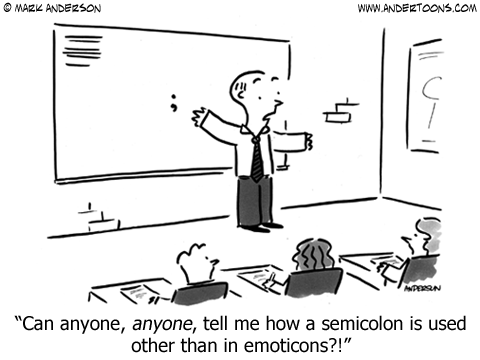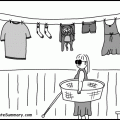Amidst The Delightfully Green Foliage

Despite many years of feuding and fussing, their notorious resort to physical mayhem and their penchant for murderous onslaught, the National Association of Grammarians once again held their annual convention amidst the delightfully green foliage of Doodlebug Island. That they were able to do so is a testament to the forgiving nature of local residents who, not too secretly, wish these grammatical storm troopers would conduct their military campaigns elsewhere. The last combatant left yesterday.
This year’s outcomes were no different from previous years, though the rancorous disagreements were noticeably louder and more pointed. Delegates appeared to agree upon only two points: that it was good to get away from the grind of classrooms; the second, it was good to travel at someone else’s expense. Past that, agreements were as hard to come by as shreds of sanity in laws passed by Congress.
Now, as editor of the local paper, I “cover” this annual event, although doing so is akin to watching water evaporate. You can’t detect anything going on although you know blessed well it is.
A lady professor from Johns Hopkins advocated teaching the semicolon as either a half period or a double comma depending upon whether it’s used as a connective or follows a series. Her efforts were followed by a moment of granite-like silence and afterward a series of jeers, catcalls, and insults. What she said made perfect sense, but that didn’t seem to dampen the spirit of acrimony present among delegates, who chose the occasion to vent a little steam.
When order was restored, the next speaker took the floor and, in a very cogent manner expressed the view that because English is a combination of other, older languages, it loses inflectionality–that cornerstone of romance languages in which verbs convey person and tense, emphasizing word placement.
“We might teach grammar more precisely by having students learn the eight uses to which nouns and pronouns are given,” the speaker said. “About ninety-five percent of the time the latter are used as subjects, direct objects and objects of prepositions. Only about five percent of the time are they used as indirect objects, subjective complements, objective complements, appositives and adverbials. Knowing how nouns and pronouns are ‘used’ contributes immensely to a student’s grammatical understanding.”
“I don’t see that it would,” shouted a voice from well back in the audience. “What about verbals and dependent clauses?”
“Yeah, and what about parenthetical, exclamatory expressions and phrases?” yelled another.
“No one grammatical approach is ever going to adequately describe English,” the speaker reasoned over the growing uproar. “And I’m not recommending my method as the definitive answer. What I’m suggesting . . .”
But whatever it was he was suggesting was lost in the tumult that followed. He’d said enough to create divisions among attendees, and those divisions soon revealed cracks, fissures and drifts that together precipitated mass hysteria. In the midst of this celebration, I made my way to the podium to thank the speaker for his insight. He was just finishing punching someone in the nose and was getting ready to practice the same sort of instruction on someone else when I broke in. He seemed momentarily glad for the kind remarks, but turned almost immediately to resume the persuasion he’d found to be effective with the first gentleman. About this time, I decided my presence was no longer needed, and I sauntered home by way of Waverly’s drugstore where I indulged myself in a double malted and contemplated the foolishness of man.
Degrees and positions, I decided, were dangerous things. They provide the illusion of attainment and mask our real ignorance. To give someone a title is to burden him with a gravitas that seems to blind him to the ignorance and lack of understanding with which creation has endowed us.
I must admit I felt pretty good about my objectivity and my tempered insight. Only later was it pointed out to me by the reality director with whom I live that I pack a few labels myself. Incidentally, “reality director” is a noun phrase used as the object of the preposition “by” and fits in the last five percent the speaker alluded to since it’s the implied appositive of “wife,” “critic,” and loving “nag” who dominates my life.





